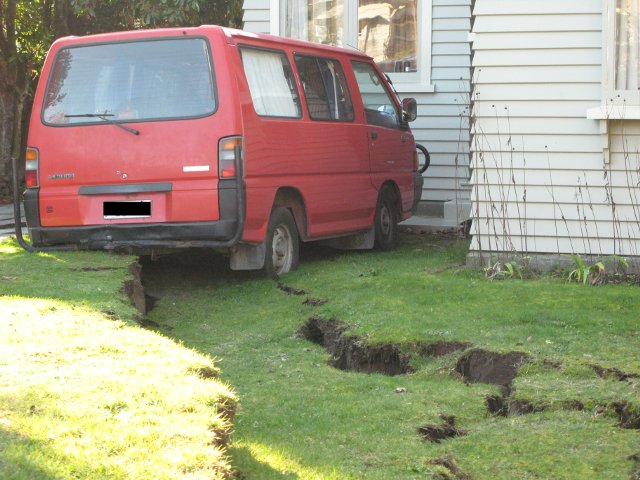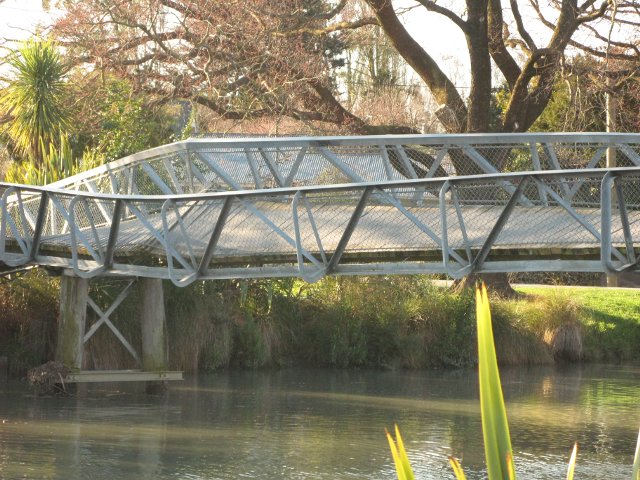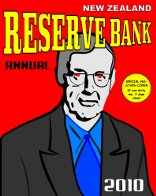A magnitude 7.1 earthquake, as we discovered on Saturday morning, sounds rather like a thousand empty wheelie bins being trundled over cobble-stones.
We'd had difficulty getting our three-year-old son to sleep the night before. Several books (one novel-length) had been read aloud by my wife; soporific ukulele music had been played until my fingers had cramp; there'd been sobbing and tears of frustration (mostly from me). Eventually, around midnight, our household slipped into a fitful slumber.
I suspect, therefore, that we were more traumatized than most to be awoken at 4.35 am. The heaving and plunging of the floor reminded me of being in a storm at sea. It's a sensation that I don't much enjoy in a boat; I absolutely loathe it on dry land.
The movement was so violent that my wife had some difficultly picking up our son. We huddled in the doorway in total darkness as pictures fell from our walls and crockery smashed in the kitchen. A series of aftershocks kept us in the doorway for an hour.
My first thought, curiously, was to hope that we were near the epicentre of the earthquake. If it had been centred any distance away -- Wellington sprang to mind, of course -- then I knew that anything at the epicentre must have been utterly destroyed. I retrieved our battery-powered radio from the wreckage in the bathroom, and discovered that my fears were unfounded; the epicentre was a mere 40 kilometres away in the town of Darfield.
The bulletins from Radio New Zealand also revealed that there was substantial damage to the infrastructure of Christchurch. Our water and electricity supply had stopped, and the radio advised us not to use the lavatory. At dawn, I went outside and dug a latrine in the bush at the back of our section.
Damage to our house initially appeared to be minor. But an inspection of the foundation walls revealed numerous gaping cracks and significant subsidence. Under the house at least one of the piles had toppled over; further aftershocks prevented me from taking a closer look.
Our chimney had, miraculously, only shed a few bricks -- although every mortar joint had been broken, and it was now merely a pile of loose masonry balanced on our roof. I watched as it shifted visibly during another aftershock. My wife brought good news from a radio bulletin; no deaths from the earthquake had been reported. It seemed almost unbelievable.
We walked along the road to check on an elderly neighbour. The damage was horrifying: huge chasms had opened in the road; the tarmac was buried in sand from ground liquefaction; a sewage pumping station had levitated a metre or so out of the earth; power poles were tilted over at crazy angles; house foundations had collapsed and floors were protruding outwards into thin air; our local footbridge across the Avon was twisted into an Escheresque corkscrew.
Above: A neighbour's van in an earthquake crack.
I kept thinking to myself: "This looks like a disaster zone." And then a few seconds later: "Oh, this is a disaster zone -- that's why it looks so much like one." In a few hundred metres we walked past tens of millions of dollars in damage. A thought occurred to me: "If the rest of Christchurch is like this, can the country even afford to fix it? Perhaps we're going to be stuck this way for a long time."
Above: The local footbridge across the Avon River.
My colleague (and friend), Emma Hart, and her husband Karl arrived shortly thereafter. It was a relief to discover that they were safe -- their new house had survived unscathed -- and enormously reassuring to hear that damage in most of the city was comparatively minor. We handed Emma and Karl the semi-defrosted contents of our freezer, and then accepted their kind invitation to spend a night at their house.
Making our way out of Avonside was far from straightforward -- only a single road had survived the earthquake. Driving through Linwood was equally bizarre. Where was all the damage? Shattered roads and houses had become entirely normalized to us over the past few hours; it was astonishing to see Linwood looking just as it had yesterday, while our own neighbourhood had been completely transformed.
The aftershocks continued, but Karl's excellent gin and tonic took a few notches off their Richter force. When not mixing drinks, Karl joined Emma in entertaining our son. My wife and I sat on the settee, and attempted to figure out what needed to be done in order to make our house fit for habitation again.
It wasn't easy to pry our son from his refugee abode the next morning. "You go home," he insisted. "I want to stay here and play with Emma and Karl." Reluctantly, he allowed us to convey him back to Avonside to check on the house. The chimney was still teetering above our roof, and we still had no electricity, water, or sewerage. We gathered a few more belongings, and continued our refugee sojourn at the house of some of my wife's colleagues, Jacqui and Roger Nokes.
Once again, we were billeted with astonishing generosity and kindness. Jacqui and her son Theo were particularly superb in their child-entertainment skills -- rather too good, in fact, in comparison to the people who our son is stuck with as his parents.
The next day, in a howling Nor'wester, I strung safety lines over our roof and attacked the chimney. It was in such a sorry state that dismantling it simply consisted of balancing on the ridge-line, reaching up, lifting the bricks from the stack, and tossing them to the ground -- where they would embed themselves in the earth in a very satisfying manner.
Part-way through disassembly, we were hit by a 4.5 Richter aftershock and I dropped my hammer into the flue, where it wedged halfway down. I thought bitter thoughts about my bad luck -- until an alternative scenario occurred to me that involved the chimney collapsing onto my head. The loss of a hammer didn't seem so bad after that.
The electricity was back on by the time I'd finished taking down the chimney -- and our friends Jeanette and Jeffrey arrived with moral support and pikelets. But we still had no water or sewerage, and since I was encrusted with soot and mortar, we decided to trespass upon the hospitality (and luxurious showering facilities) of Jacqui and Roger for one more night.
And now we are back in our own house -- in a very depopulated street. Many of the neighbours have been evacuated; although some of them have departed simply to escape the aftershocks. One neighbour hadn't been able to eat since a pair of 5.2 Richter shakes on Monday. Another hadn't eaten or slept since the initial earthquake on Saturday morning.
I've just spoken to a workman inspecting the sewerage system, who told me that he was in a state of shock with regard to the damage. "People are talking about weeks to get this fixed," he said, "but it's going to be years before we've rebuilt the infrastructure that's been lost here."
Nevertheless, as far as we're concerned, it's going to take more than an earthquake to get us out of our house. We love our life beside the river in Christchurch. And we're here to stay.
Postscript: We've just had our water supply reconnected -- hooray for the council!


